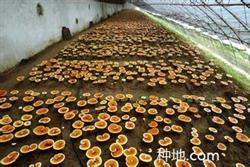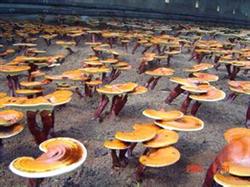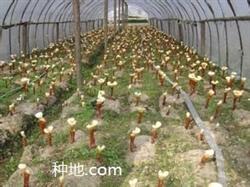How to grow Ganoderma lucidum?

How to grow Ganoderma lucidum? What aspects should we pay attention to? The following Ganoderma lucidum planting techniques can be used for your reference: Ganoderma lucidum, alias Ganoderma lucidum, etc., which can nourish and strengthen, eliminate inflammation and expectoration, relieve cough and asthma, and so on. The production of bottle (or bag) Ganoderma lucidum is relatively simple and easy to learn. (1) the preparation of nutrients. ① sawdust about 75%, wheat bran about 25%, ammonium sulfate about 0.2%, mixture water content 70%; ② sawdust about 75%, wheat bran about 25%, mixture water content 60%; ③ sawdust about 50%, wheat bran about 50%, urea 0.1%, mixture water content 60%; ④ cottonseed husk 79%, wheat bran about 20%, sucrose 1%, mixture water content 60%. ⑤ corn shaft residue 50%, sawdust about 30%, wheat bran about 20%, mixture water content 60% 65%; ⑥ poplar leaves 75%, rice bran (or wheat bran) 25%, mixture water content 60%; ⑦ rice straw powder 45%, miscellaneous sawdust about 30%, wheat bran (or rice bran) about 25%, mixture water content 60% 65%. (2) loading and sterilization. Mix the culture material, simmer for half an hour and then load. Conventional plastic bags can hold 0.25 to 0.3 kilograms of dry material. When bagging, the material should be compacted by hand and the material surface should be flat, then use a tapered wooden stick to pierce a 2.5 cm diameter vent from the middle of the material surface, plug the cotton plug at the mouth of the bag and wrap a layer of Kraft paper. If bottled, a jar or mushroom bottle with a volume of 500 to 1000 milliliters and a caliber of 3.3 to 4.6 centimeters can be used. The filling method is basically the same as that in the bag. After loading, put the bag (or bottle) in the pot in layers and sterilize under the pressure of 1.5 kg / square centimeter for 1 hour for 2 hours, or atmospheric pressure for 8 hours for 10 hours. It is required to be loaded, sterilized and vaccinated on the same day. (3) inoculation and culture. Inoculation is best carried out in the inoculation box, if there is no inoculation box, above the alcohol lamp flame or above the boiling water vapor. The inoculation room and vaccination tools should also be strictly disinfected. The staff should put on masks and wash their hands three times with soap. Take a jujube-sized strain from the bottle with inoculation rakes or tweezers and quickly put it into the cultivation bottle (bag). Then the bottle mouth (or bag mouth) is stuffed with cotton stopper and wrapped with Kraft paper, and transferred to the sterilized culture room for culture and sterilization. Keep the room temperature 24 ℃? 28 ℃, and the mycelium will be full in the bottle (bag) about 25 days after inoculation. In the germicidal stage, the management should be strengthened to prevent miscellaneous bacteria pollution, and those with miscellaneous bacteria pollution should be eliminated in time. When the bottle (bag) is full of hyphae, the white buds with large fingers gradually appear on the surface of the culture material, that is, the fruiting body primordium. When its growth is close to the cotton plug, the cotton plug can be removed, the room temperature is controlled at 26 ℃-28 ℃, the relative humidity is increased to 80%-90%, the scattered light is given, the air is ventilated every day, and the bottle (bag) mouth can grow out of the stalk after about 20 days, and the end of the handle can differentiate into a cap. When the light white or light yellow on the edge of the cap disappears, the edge of the cap stops growing and becomes hard, and it can be harvested when the color changes from bright to dark pink brown. (4) Disease control. In the process of production, attention should be paid to prevent the infection of miscellaneous bacteria, such as Penicillium, Mucor and Rhizopus. Prevention and treatment methods: the inoculation process should be strictly aseptic; the culture materials should be sterilized thoroughly; properly ventilated to reduce humidity; those with mild infection should be scraped off the local miscellaneous bacteria and surrounding bark with a disinfection blade, and then smeared with concentrated lime milk. or fill the hole with skimmed cotton dipped in 75% alcohol; those with serious pollution should be eliminated in time. See more planting techniques of Ganoderma lucidum
- Prev

How can ganoderma lucidum be cultivated for high yield?
How can ganoderma lucidum be cultivated for high yield? Please elaborate on Ganoderma lucidum also known as Ganoderma lucidum grass, fairy grass. It is a rare large-scale medicinal fungus, its fruiting bodies and spores for medicinal purposes, with nourishing fitness, longevity effect, in the clinical treatment of neurasthenia, chronic bronchitis, gastropathy, liver disease, high...
- Next

What should be paid attention to in the cultivation of Ganoderma lucidum with short-section wood?
What should be paid attention to in the cultivation of Ganoderma lucidum with short-section wood? Please advise short-section wood cultivation of Ganoderma lucidum need to pay attention to the following points: (1) the section of wood treatment to select suitable tree species, cut down in the dormant period, cut into 1-1.2 meters long, accumulation fermentation for 30-40 days. (2) inoculation, inoculation when the temperature is about 20 ℃ (about 4 ~ 5 months).
Related
- Fuxing push coffee new agricultural production and marketing class: lack of small-scale processing plants
- Jujube rice field leisure farm deep ploughing Yilan for five years to create a space for organic food and play
- Nongyu Farm-A trial of organic papaya for brave women with advanced technology
- Four points for attention in the prevention and control of diseases and insect pests of edible fungi
- How to add nutrient solution to Edible Fungi
- Is there any good way to control edible fungus mites?
- Open Inoculation Technology of Edible Fungi
- Is there any clever way to use fertilizer for edible fungus in winter?
- What agents are used to kill the pathogens of edible fungi in the mushroom shed?
- Rapid drying of Edible Fungi

